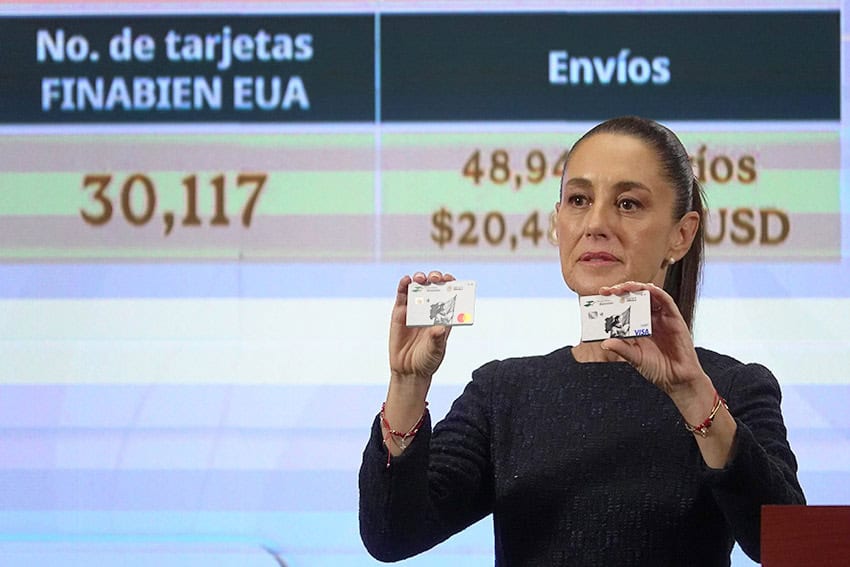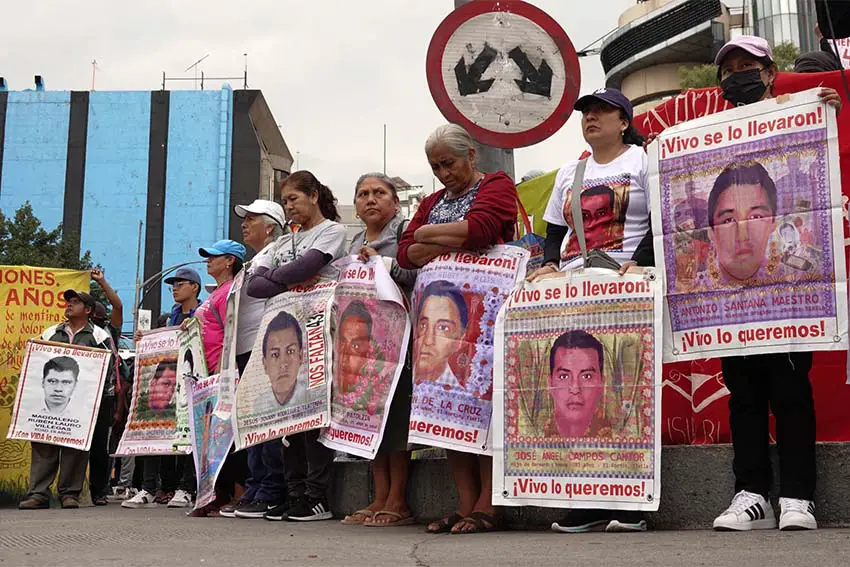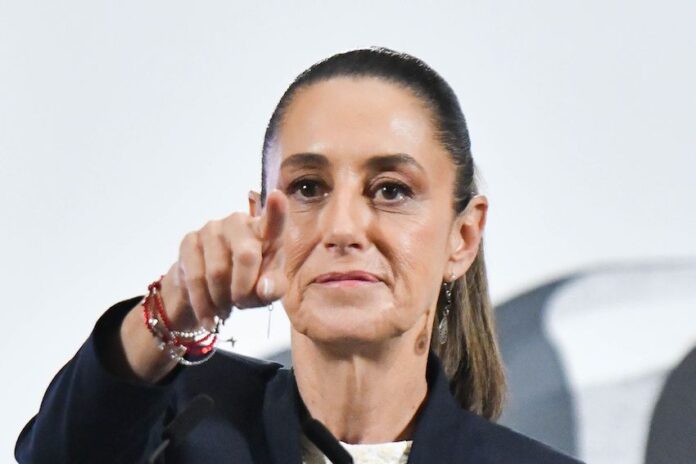At her Wednesday morning press conference, President Claudia Sheinbaum spoke about the strong demand for a government bank card in the United States.
Among other topics, she also discussed the Mexican economy and the almost 11-year-old Ayotzinapa case involving the disappearance of 43 students in Guerrero.
Here is a recap of the president’s July 30 mañanera.
50,000 Mexicans in US have requested government bank card to avoid new remittance tax
Earlier this month, Sheinbaum promoted a government bank card that can help Mexicans living in the United States avoid the new 1% remittance tax on cash transfers that will take effect on Jan. 1, 2026.
On Wednesday, a reporter asked the president how many Mexicans already have the Finabien bank card.
Sheinbaum said that about 50,000 Mexicans have requested the card “by mail,” but didn’t specify how many people have already received it. Distribution of the card began a week ago.

Sheinbaum said that the government has the capacity to supply Finabien cards to all Mexicans in the U.S. who want one.
The card can be acquired at 53 consulates in the U.S., by mail or via digital application at miconsulado.sre.gob.mx.
Sheinbaum said that around 70% of remittances from the United States to Mexico are sent electronically by Mexicans who have a bank account in the U.S. or “some kind of card” that allows them to transfer money to their families.
She said that around 30% of remittances are sent via “these tienditas [small stores] that there are in different places in the United States.”
Sheinbaum was apparently referring to shops, including grocery stores and convenience stores, where people can transfer money to Mexico using services such as Western Union.
“They pay in cash and … say: ‘Please send this remittance to such and such place’ … and their families pick it up there,” she said.
“So, for that 30%, we’re giving them the option to do it in an easier way, electronically through the Finabien card,” Sheinbaum said.
‘The economy of Mexico is strong, it’s solid,’ says Sheinbaum
Sheinbaum noted that the national statistics agency INEGI reported economic growth rates for the second quarter of 2025. Mexico’s GDP increased 0.7% compared to the first quarter of the year and 1.2% annually in seasonally adjusted terms.
Mexico’s economy grew 0.7% in Q2, outpacing analysts’ forecasts
She also acknowledged that the International Monetary Fund (IMF) raised its forecast for the Mexican economy in 2025.
“They said the economy was going to collapse, that it was going to be a 0.3% contraction … and from here we said you are wrong,” Sheinbaum said.
“The economy of Mexico is strong, it’s solid,” she added.
The IMF is now forecasting that the Mexican economy will grow 0.2% in 2025.
Referring to U.S. President Donald Trump’s protectionist agenda, Sheinbaum conceded that “the issue of tariffs” has caused economic uncertainty, not just for Mexico, but for the “whole world.”
“And particularly for Mexico due to the economic integration we have with the United States. But the plan we developed is producing results and it will be even more effective next year,” she said, referring to the Plan México economic initiative.
Sheinbaum subsequently said while GDP growth is “one way of measuring the economy,” it shouldn’t be the only one “because the growth of the economy doesn’t necessarily reflect good salaries, well-being of the people and the reduction of inequalities.”
“And in Mexico, there has been a reduction in poverty, a reduction in inequality and more well-being for the people of Mexico,” she said.
Is a breakthrough coming in the Ayotzinapa case?
A reporter noted that the president met on Tuesday with parents of the 43 Ayotzinapa Rural Teachers’ College students who disappeared in Guerrero in 2014. She highlighted that the parents said after the meeting that they didn’t see any progress in the investigation into the almost 11-year-old case.
Sheinbaum said that the Federal Attorney General’s Office, supported by the federal Security Ministry, is working with “new investigation tools” and “new methods” as it it seeks to locate the students, of whom the remains of just three have been found.
“I think they will provide new ways to find the young men and learn the whole truth,” she said.

“… I understand the situation of the fathers and mothers who … are always looking for their sons, and answers, as well,” Sheinbaum said.
“Of course we understand their pain and their situation,” she said.
Sheinbaum said that she hoped to be able to provide an update on the investigation in early September, when she is scheduled to meet once again with the parents of the students, who were abducted in Iguala, Guerrero, on the night of Sept. 26 2014, and presumably murdered.
Over 100 people, including army personnel, have been arrested in connection with the case, but no one has been convicted of the crime.
By Mexico News Daily chief staff writer Peter Davies ([email protected])
